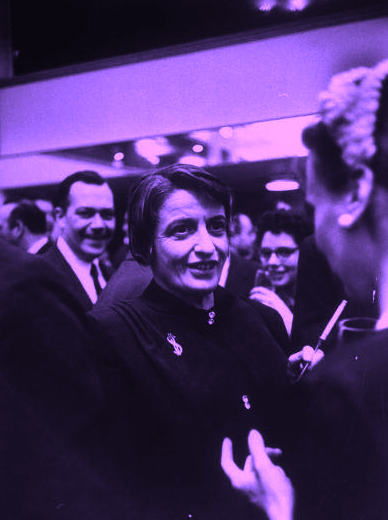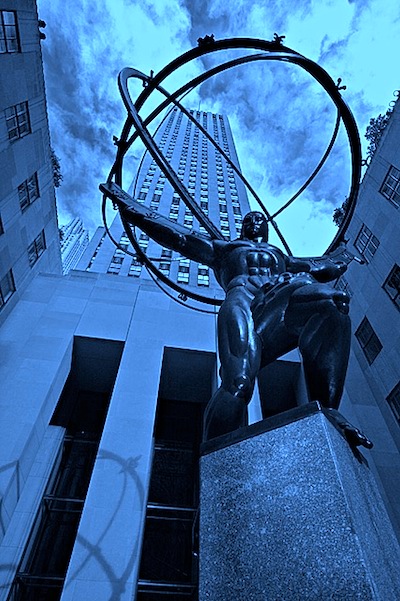
By David Ross. What sufficed the growing boy suffices the grown man. I read Ayn Rand’s entire oeuvre between the ages of fourteen and eighteen. It made an enormous impression in the usual ways, confirming my nascent conservatism and even more my nascent romanticism, on which paths, political and literary, I remain to this day. Rand led to Victor Hugo and George Sand, which led to my life’s work as a student of literature and circuitously to my permanent preoccupation with a certain romantic and conservative strand in modernism whose great avatar (if James Cameron has not entirely compromised the word) is William Butler Yeats. Rand also helped engender my reverence for the great achievers and achievements of civilization, which is, I believe, my greatest asset as a teacher to this day. Rand might not approve my heroes, but she would approve my penchant for hero worship. I have never sympathized with industrialism as a symbol or model of human creativity, nor desired to remake myself into an unsmiling and inflexible hero of what Rand calls rationalism, nor felt the need to hammer my haphazard libertarianism into consistent and rigid doctrine, but all the same I am her progeny. For better and worse, I have been formed by her in uncountable ineffable ways.
The Obama era was, for me as for so many others, an open invitation to reread Rand, so thoroughly does she seem to diagnose the psychology of our present slide into statism (Obama’s constant rhetoric about sibling-keeping might as well be plucked from the mouth of Wesley Mouch). News that Atlas Shrugged is finally being filmed also helped inch the book to the top of my pile (see Libertas’ interviews with director Paul Johannson here and here).
I was trepidacious, however, not sure to what extent I might have outgrown Rand. I was not concerned about the palatability of her philosophy, to which I have never specifically subscribed, but about her prose and her craftsmanship, which self-congratulatory journalist types constantly deride as second-rate, the kind of thing that only a teenager or cultist could fail to smirk at. This passing reference in a December article in the Weekly Standard is typical:
Atlas Shrugged, while a perennial bestseller and an important artifact of 20th-century culture, is not exactly great literature (stilted dialogue and cardboard characters have ranked among the defects pointed out by critics).
I have now reread the first half of Atlas Shrugged, and I can offer my very educated opinion that it is great literature, not necessarily at the sentence level, but in the unstoppable propulsion of its narrative (has a philosophical novel ever been so engrossing?), in the massive, dauntless sweep of its ideas, and in its enormous imaginative feat of creating a myth of our entire world (Dante and Milton are Rand’s compeers in this limited, formal respect).

Even more, Atlas Shrugged is a great work of literature in its comprehensive taxonomy of modern men, in its comprehension of all their hidden springs and insecurities and frustrations and ambitions. Rand fancied herself a political theorist and metaphysician, but she misunderstood herself; she was a psychologist foremost, and Atlas Shrugged is a formidable system of psychology to contraindicate that of Freud. Eschewing the usual bedroom and bathroom preoccupations, Rand grasps that behavior is driven by what she calls ideals, conscious or unconscious structures of value that provide the context for everything we do and everything we are. Freud tends to reduce these structures to underlying psychosexual dynamics, but Rand insists on their primacy and irreducibility, and she illustrates their role as the ceaseless motive forces of life. She is also a particularly shrewd diagnostician of a certain kind of resentment and leveling instinct – James Taggart is the obvious embodiment – and she is nearly alone in realizing that this mindset is no trivial phenomenon but the rotting core of our world, explaining everything from the Soviet world-blight to our failing schools and lousy art.
Rand’s characters are ‘cardboard’ in the sense that they speak for philosophical positions and represent certain types, but each character embodies something slightly different; there is no overlap or redundancy. In the aggregate, they form a spectrum of humanity – a human comedy – that is convincing and powerfully explanatory. Rand is accused of engaging in moral black and white, but this is not entirely fair; while her scheme is moral in logic and purpose, many of her characters – Dr. Stadler for example – represent subtle, equivocal positions. They are not gray, but an intricate admixture of black and white.

Rand sketches her characters in only a few clean strokes, but these strokes are rendered so deeply and forcefully as to be ineffaceable. Who can forget Hank Reardon or Dagny Taggart? Who can forget their triumphant inauguration of the John Galt Line? Who can forget their strange, violent lovemaking? What character drafted by Henry James, by contrast, does anything but deliquesce and drift imperceptibly from consciousness, becoming a vague haze of inflection and velleity?
Atlas Shrugged is a great novel, finally, in its astonishing originality. It has no precedent in terms of style, tone, mood, or philosophy, as far as I know. Victor Hugo may account for its sweep and social engagement, and someone like Zamyatin may have influenced its anti-totalitarianiasm and latent dystopianism, but nothing accounts for its strangeness, for everything powerfully eccentric and not infrequently repellent that Rand herself brings to it, everything rooted in the passionate kinks and quirks of her personality. In the end, it belongs in the category of the sui generis along with modern masterpieces like Ulysses, The Castle, and Pale Fire. It does not rival the artistry of these works, but it similarly emerges from a unique and bizarre mind.
Rand’s ultimate strength is her unswayable belief in herself as an arbiter of value and reality, and her passionate self-investment in every page she wrote. Her intent was doctrinaire, but her triumph is romantic.
Addenda:
- See Rand on YouTube in all her rebarbative glory: here, here and here.
- Whittaker Chamber’s fascinating, fiercely antagonistic, latently Christian review from the December 28, 1957, issue of National Review.
- National Review’s contemporary take, likewise antagonistic.
- The New York Times notes some of the book’s contemporary admirers, including Alan Greenspan.
Posted on December 17th, 2010 at 3:10pm.
I agree for the most part about Atlas Shrugged is great literature in style, mood, tone and tenor and not so much at the ‘sentence level.’ What I disagree with a little is that the philosophy is not a major driving force in the appeal of the story. And not just for the idea of hero worship not being an act that needs looked down upon. I came to the book late in life, after I had come to traditional conservatism and I practiced that ideology in a way that could only be accurately described as typical Republican. And I certainly mean that with every bit of good and bad that’s implied by the word. When I read AS, I was floored and it lead to a much happier independent political existence. What I found though, what surprised me, was how broadly Objectivism could be applied. Not just with politics, business or income taxes, but with such obscure things as about how best to fix the Bengals NFL franchise and whether or not to ‘sanction the victimization’ they inflict on their fans. I’ve even used it on an argument with a family member when he claimed that I was the cause of him treating me poorly. It really surprised me that the philosophy was so well rounded. Of course I don’t practice fully since I am also a Christian, but I have used it enough to say that in addition to being great literature, the philosphy itself is a huge draw for me.
This is possibly the best piece I’ve ever read about Atlas Shrugged — and maybe even Ayn Rand, too.
It’s also nice to see the Obama administration inspired someone else to reread Atlas Shrugged. In fact, I reread the novel for the first time that day after the 2008 election. The man hadn’t even been inaugurated yet, and I knew another reading was needed — even though I knew what to expect, and had seen all of his foreshadowing in our political landscape.
You also couldn’t have found a better quote as an example of her criticism. I have friends with masters degrees in literature that say the same thing. I may only hold a bachelor’s degree in English lit, but I can see the deft use of every literary device imaginable in Atlas Shrugged. It’s no small accomplishment to write such a deeply personal novel in such an elegant manner — from her prose, to her construction, to her characterization.
Speaking of her prose, I haven’t read many current authors that weave words so effortlessly. I think her background as a screenwriter helped her write so efficiently. One time, I tried to count passive phrases in Atlas Shrugged, and I could only fine one or two instances on every two or three pages.
And, oh yeah … all the guns, sex, weapons of mass destruction, open warfare, and even pirates don’t hurt.
Agree with your points about the sweep of the story and the efficient descriptive prose. What bothers me when I’ve read the book is that she was attempting to use a giant Hollywood screenplay to publish her philosophical ideas.
It would have been much better to write up her philosophy in the normal way and then base her story on that. The subsequent long philosophical speeches incorporated into the book distract from the story significantly while also diluting her ideas. This also led to her later books, which did use a logical format, having to refer back to her “story” books.I think this format has resulted in her not being taken seriously by academics at the university level. When I went to school, anyway, Rand was a non-entity in the philosophy departments.
You definitely said it better than me
ATLAS SHRUGGED is a remarkable exposition on statist forces and how they depend on surrender and “self-immolation” in order to advance. Ayn Rand gives us a framework to recognize the patterns and deceptions inherent in creeping statism. She presciently wrote a handbook for us 50 years in advance. Granted, it’s a long read with tedious soliloquy, but its dialogue is outstanding. I found the audiobook very enjoyable. Rand’s THE FOUNTAINHEAD is a fabulous follow-up.